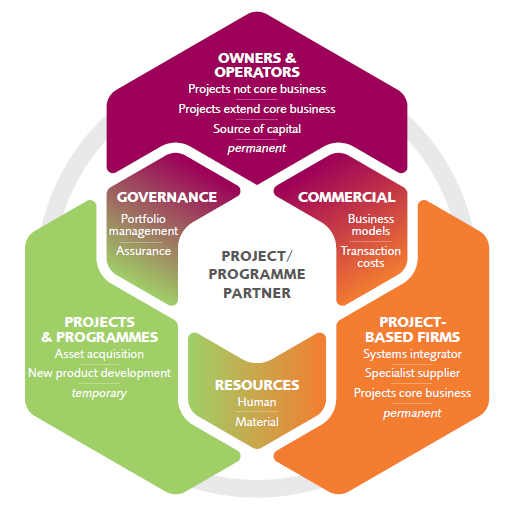Three domains of project organising
Article highlight
This article challenges the belief that project organising is temporary.
It argues that most project organising is done by (relatively) permanent forms of organisation.
It also argues that the belief of its temporary nature has limited the development of research in this field.
What does the paper cover?
This paper develops a conceptual framework, which defines three domains of project organising as its theoretical basis. It also identifies two important new areas for future research in project organising.
Conceptual framework of the three domains of project organising
The framework shows the three main organisational types in
the field of projects:
- the relatively permanent owner and operator;
- the temporary project or programme;
- the relatively permanent project-based firm as supplier.
Methodology
The arguments in this study were developed through a critical review of selected literature in three areas of project organising:
- project organising as temporary organising;
- more recent literature on project-based firms;
- the gap in between the first two, that is, the role of the owners as investors in and operators of the outputs created by the project.
Research findings
A brief summary of the literature review is as follows.
Project organising as temporary organising: The literature review on projects as temporary organisations shows that the concept is deep-rooted in academic research and is defined as such in the Project Management Institute’s Project Management Body of Knowledge. However, there are some studies that argue that the analysis should be extended to include attention to the interface of the project with its parent organisation.
In this article, Graham Winch uses the term ‘temporary’ to mean ‘determinate’: the project will be terminated at a pre-agreed point, which is agreed early on in the project life cycle by the involved parties.
Project owners and operators: Permanent organisations may become owners and operators of projects when they want to expand or upgrade their ability to deliver services. The role of these permanent firms as owners and operators of infrastructure has important implications for project organising, but there has been little explicit attention paid to them in the literature. This paper reviews the research of suppliers to owners and operators of the resources needed for projects and programmes.
Project suppliers: Owners and operators typically hire suppliers of project-related services, which are usually organised as permanent project-based firms. These firms bring skilled people together to work on tasks for a variety of owners and purposes. Projects are their core business, and it is important to realise how these firms fit into the framework.
Project organising as temporary configurations of permanent organisations: This study shows how project organising is best seen as a configuration of permanent organisations coming together to form a temporary coalition to deliver an outcome. These interactions should form the basis of new and challenging research for project organising.
Conclusions
This theoretical research study develops a conceptual framework of project organising (see page 1) as a combination of temporary and permanent organisations. The framework provides the basis for further theory development and future research.
This paper also identifies that, because the focus has mainly been on projects as temporary organisations, this has limited the range of research in this field. More research is needed in two areas:
- at the interface between the three domains of project organising: governance, commercial and resources; and
- on project organising as temporary configurations of permanent organisations, in coalition, to deliver outputs.

